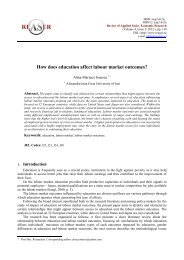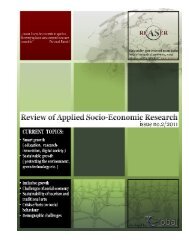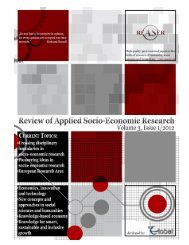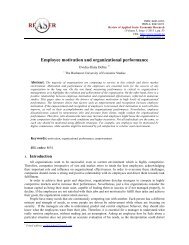new characteristics of inequalities in the information society and ...
new characteristics of inequalities in the information society and ...
new characteristics of inequalities in the information society and ...
You also want an ePaper? Increase the reach of your titles
YUMPU automatically turns print PDFs into web optimized ePapers that Google loves.
ISSN: 2247-6172;<br />
ISSN-L: 2247-6172<br />
Review <strong>of</strong> Applied Socio- Economic Research<br />
(Volume 5, Issue 1/ 2013 ), pp. 176<br />
URL: http://www.reaser.eu<br />
e-mail: editors@reaser.eu<br />
differentiat<strong>in</strong>g it from “susta<strong>in</strong><strong>in</strong>g happ<strong>in</strong>ess” or “susta<strong>in</strong>able <strong>in</strong>creases <strong>in</strong> happ<strong>in</strong>ess” (O’Brien, 2012).<br />
Discussions <strong>of</strong> happ<strong>in</strong>ess <strong>and</strong> well- be<strong>in</strong>g are an ideal entry po<strong>in</strong>t for foster<strong>in</strong>g susta<strong>in</strong>able lifestyles<br />
<strong>and</strong> policies for susta<strong>in</strong>able happ<strong>in</strong>ess <strong>and</strong> well-be<strong>in</strong>g. Happ<strong>in</strong>ess is at <strong>the</strong> heart <strong>of</strong> who we are <strong>and</strong> what<br />
we do, but <strong>in</strong> a consumer <strong>society</strong> where consumption <strong>and</strong> happ<strong>in</strong>ess are <strong>of</strong>ten entangled, <strong>in</strong>dividuals<br />
confuse <strong>the</strong> “path to <strong>the</strong> ‘good life’ as <strong>the</strong> ‘goods life’” (Kasser, 2006: p. 200). The lifestyles <strong>and</strong><br />
consumption <strong>in</strong> <strong>the</strong> wealthiest nations are lead<strong>in</strong>g to environmental degradation that has <strong>the</strong> greatest impact<br />
on less affluent countries (Sachs, 2012). The HPI <strong>in</strong>dicates that many <strong>of</strong> <strong>the</strong> wealthiest countries are<br />
exert<strong>in</strong>g extensive pressure on natural resources <strong>and</strong> consum<strong>in</strong>g more than <strong>the</strong>ir fair share <strong>of</strong> resources<br />
(Abdallah et al., 2009, 2012).<br />
Th<strong>in</strong>ley (2012) underscored <strong>the</strong> need for consider<strong>in</strong>g <strong>the</strong> l<strong>in</strong>ks between susta<strong>in</strong>ability <strong>and</strong> happ<strong>in</strong>ess:<br />
“Susta<strong>in</strong>ability is <strong>the</strong> essential basis <strong>and</strong> precondition <strong>of</strong> such a sane economic system. An economy exists<br />
not for mere survival but to provide <strong>the</strong> enabl<strong>in</strong>g conditions for human happ<strong>in</strong>ess <strong>and</strong> <strong>the</strong> well-be<strong>in</strong>g <strong>of</strong><br />
all life forms” (p. 64).<br />
There is a major role for positive psychology to play <strong>in</strong> build<strong>in</strong>g fur<strong>the</strong>r political will <strong>and</strong><br />
br<strong>in</strong>g<strong>in</strong>g susta<strong>in</strong>ability pr<strong>in</strong>ciples <strong>in</strong>to everyday life. The concept <strong>of</strong> susta<strong>in</strong>able happ<strong>in</strong>ess with<strong>in</strong> <strong>the</strong> field<br />
<strong>of</strong> positive psychology can be applied to foster susta<strong>in</strong>able behavior <strong>in</strong> addition to well-be<strong>in</strong>g <strong>in</strong> <strong>the</strong><br />
broadest mean<strong>in</strong>g <strong>of</strong> well-be<strong>in</strong>g, i.e. physical, emotional, social, spiritual, ecological well-be<strong>in</strong>g. Whereas<br />
we all have a natural desire for happ<strong>in</strong>ess, we are likely to lead more susta<strong>in</strong>able lives by becom<strong>in</strong>g<br />
more aware that our well-be<strong>in</strong>g <strong>and</strong> pursuit <strong>of</strong> happ<strong>in</strong>ess is associated with <strong>the</strong> well-be<strong>in</strong>g <strong>of</strong> o<strong>the</strong>rs <strong>and</strong> <strong>the</strong><br />
natural environment (O’Brien, 2010a). Susta<strong>in</strong>able happ<strong>in</strong>ess disputes a common misconception that liv<strong>in</strong>g<br />
susta<strong>in</strong>ably will lower our quality <strong>of</strong> life. Ra<strong>the</strong>r, susta<strong>in</strong>able happ<strong>in</strong>ess <strong>in</strong>vites opportunities to enhance our<br />
quality <strong>of</strong> life <strong>and</strong> contribute to <strong>in</strong>dividual, community, <strong>and</strong> global well-be<strong>in</strong>g (O’Brien, 2010a).<br />
Education for <strong>the</strong> 21st century can promote positive education <strong>and</strong> positive schools by apply<strong>in</strong>g<br />
positive psychology <strong>in</strong> teacher education <strong>and</strong> contribut<strong>in</strong>g to curricula development. Students <strong>and</strong><br />
<strong>society</strong> would benefit from greater attention to student wellness, illness prevention, <strong>and</strong> happ<strong>in</strong>ess skills<br />
for enhanced resilience (Seligman, 2011). This would be a progressive step forward but still grossly<br />
<strong>in</strong>sufficient to foster <strong>the</strong> massive shift <strong>in</strong> values <strong>and</strong> behavior that are required to make a transition towards a<br />
more susta<strong>in</strong>able future—which ultimately impacts everyone’s well-be<strong>in</strong>g. Integrat<strong>in</strong>g positive psychology<br />
with susta<strong>in</strong>ability education would <strong>in</strong>troduce a comprehensive transformation <strong>in</strong> education, engag<strong>in</strong>g<br />
students <strong>and</strong> teachers <strong>in</strong> a deep underst<strong>and</strong><strong>in</strong>g <strong>of</strong> how to live <strong>and</strong> work, respect<strong>in</strong>g <strong>the</strong>ir own well-be<strong>in</strong>g <strong>and</strong><br />
<strong>the</strong> well-be<strong>in</strong>g <strong>of</strong> o<strong>the</strong>r people, o<strong>the</strong>r species, <strong>the</strong> natural environment, <strong>and</strong> future generations. It would<br />
assist students <strong>and</strong> educators to recognize that our well-be<strong>in</strong>g is <strong>in</strong>terdependent <strong>and</strong> that our daily activities<br />
can contribute to, or detract from well-be<strong>in</strong>g. It would also permit students <strong>and</strong> educators to make <strong>in</strong>formed<br />
decisions about policies that impact well-be<strong>in</strong>g (O’Brien, 2012).<br />
4. Conclusions<br />
In sum, children – like adults – are likely to adapt <strong>the</strong>ir sense <strong>of</strong> life satisfaction both to <strong>the</strong>ir own<br />
realities <strong>and</strong> to <strong>the</strong> examples <strong>and</strong> norms set by <strong>the</strong> societies <strong>in</strong> which <strong>the</strong>y live. There is a need for changes<br />
<strong>in</strong> attitudes, policies, practice <strong>and</strong> behavior. Specifically, opportunities for <strong>in</strong>tegrat<strong>in</strong>g positive psychology<br />
with susta<strong>in</strong>ability education are discussed <strong>in</strong>clud<strong>in</strong>g work <strong>in</strong> <strong>the</strong> area <strong>of</strong> susta<strong>in</strong>able happ<strong>in</strong>ess,<br />
Education for Susta<strong>in</strong>able Development (ESD) <strong>and</strong> positive education. Susta<strong>in</strong>able happ<strong>in</strong>ess underscores<br />
<strong>the</strong> <strong>in</strong>terrelationship between human flourish<strong>in</strong>g <strong>and</strong> ecological resilience. Thus susta<strong>in</strong>able happ<strong>in</strong>ess <strong>and</strong><br />
well-be<strong>in</strong>g are <strong>in</strong>tegral to build<strong>in</strong>g susta<strong>in</strong>able futures, <strong>and</strong> positive psychology could be <strong>in</strong>creas<strong>in</strong>gly<br />
<strong>in</strong>fluential <strong>in</strong> lead<strong>in</strong>g research <strong>and</strong> education that heralds a <strong>new</strong> era <strong>of</strong> underst<strong>and</strong><strong>in</strong>g <strong>and</strong> political will to<br />
embrace susta<strong>in</strong>ability.








